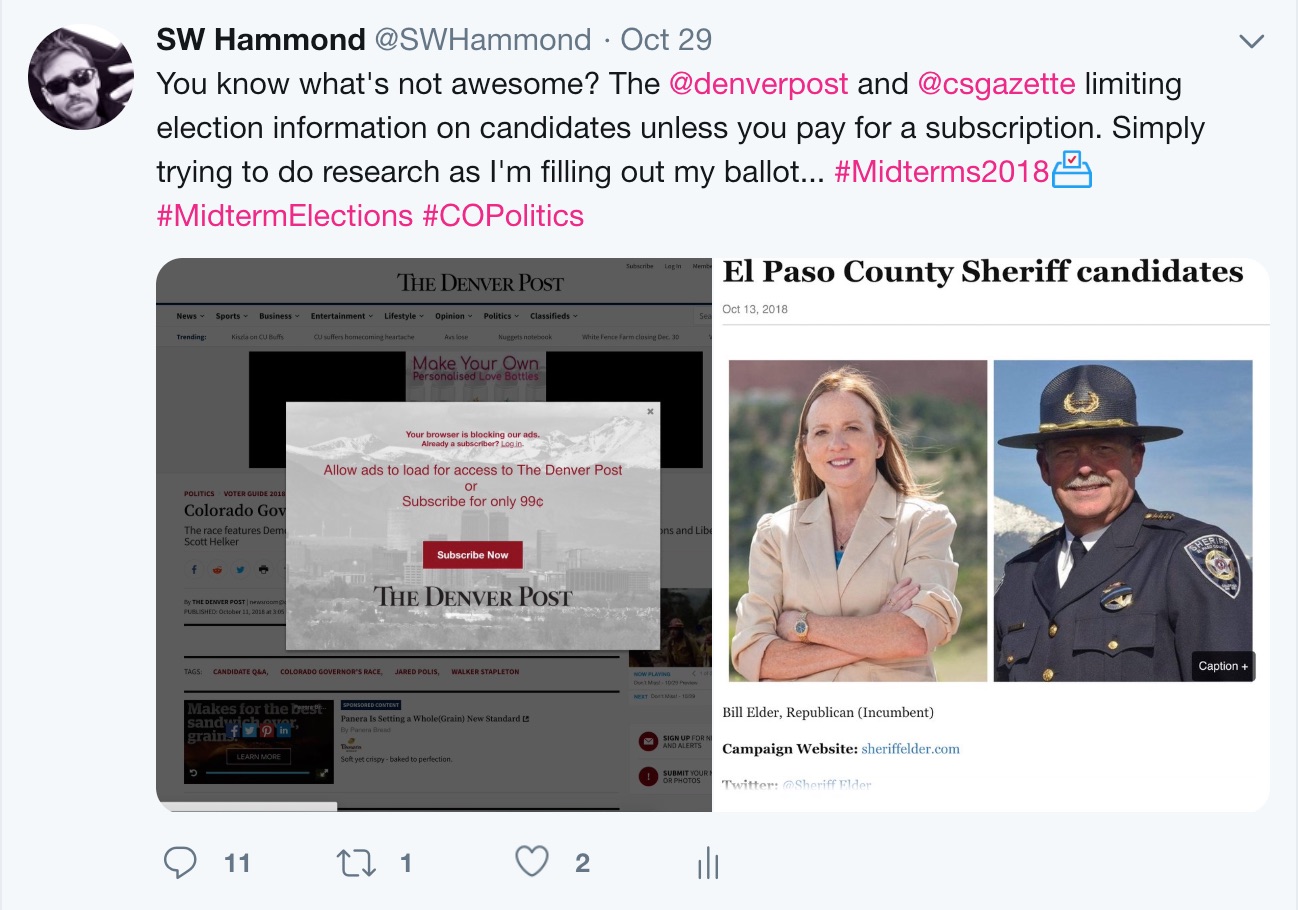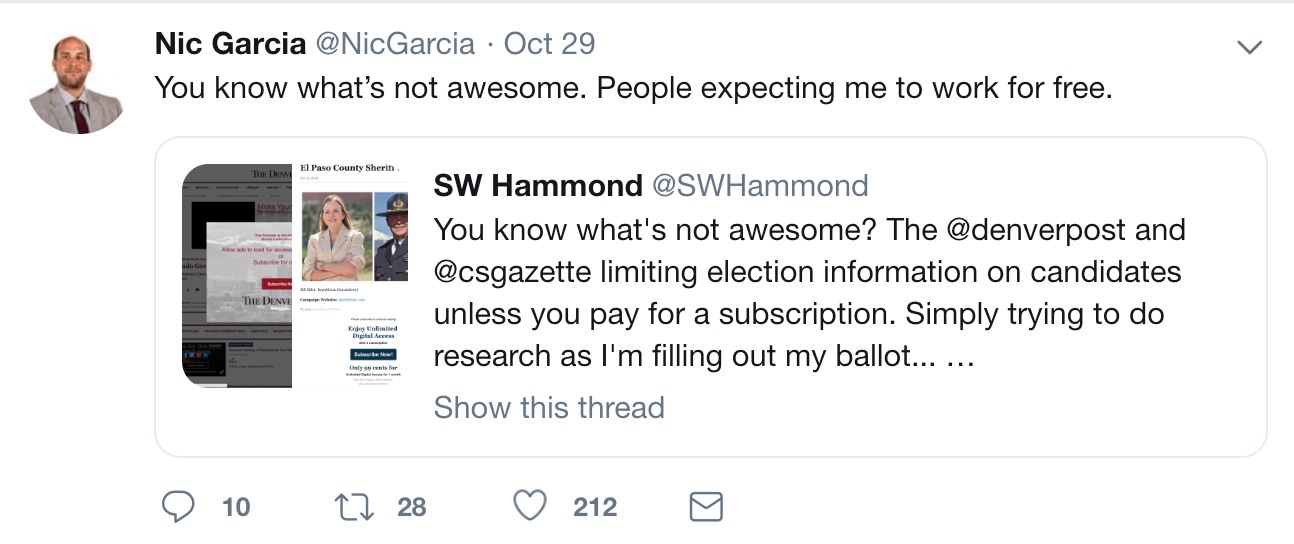Journalism: 5 Reasons Why Newspapers Have No Future

No matter your political stance, newspapers are organizations of sensationalism, partisanship, editorial opinion, and payola. Journalists must abandon these institutions to rebuild credibility.
I caused some hurt feelings on Twitter the other day. While filling out my ballot for the midterm elections, I took to the internet to help make sense of convoluted wording of the propositions. First off, that’s saying something about the voting process. I have a degree in philosophy and found it easier to understand Spinoza than the different amendments and propositions that I was voting for.
To gain clarity, I went to Google and began searching. Naturally, my local newspapers—namely The Denver Post and Colorado Springs Gazette—continued to pop up in the results. Once clicking on them, I quickly found that all of the important information about candidates and the propositions was gated behind a paywall. These sites required that I buy a subscription to view this content.
Initially, I was pretty taken aback by this. Here we are in an important election, one where participation is at its lowest, and these companies are blocking engaged voters from civic information. I knew with a few more clicks I could find the information I was looking for without the need of these papers, but what about the less savvy user or first time voter? I took a couple of screen shots of the paywalls, wrote a pretty bland caption and posted it on Twitter.
“You know what’s not awesome? The @denverpost and @csgazette limiting election information on candidates unless you pay for a subscription. Simply trying to do research as I’m filling out my ballot… #Midterms2018 #MidtermElections #COPolitcs”@SWHammond

Within minutes, a political journalist from The Denver Post, Nic Garcia, quoted my tweet and added;
“You know what’s not awesome. People expecting me to work for free.”@NicGarcia

Snarkiness was met with snarkiness, the vast majority of his followers taking his side, and I had numerous journalist reach out and try to shame me for my comment. I’ll be honest, when I wrote the tweet I never considered journalists, their profession and livelihood, nor was I considerate of their shrinking industry. My frustration was directed at the newspapers themselves, not the people who work for them.
To further my honesty, and this isn’t so much of an attack on journalists but rather the legacy industry they work for, but I don’t value their work. I am not a Trump supporter, I am not a right winger, but I can’t trust these organizations as all they push are agendas. I can't imagine spending a single cent on their product. Journalists trying to survive and dig out any foothold they can among the remaining people who pay attention to them have transformed themselves into personalities—and I’m not interested in their theatrics or opinion.
Here’s 5 reasons why newspapers have no future:
One, we don’t need newspapers for anything—the services they used to provide pre-Google are no longer relevant. I don’t use the newspaper to check for movie times, sports scores, community calendars, classifieds, etc., etc. The only niche newspapers served was local reporting, local politics, and arts and leisure. However, due to shrinking revenue and a decline in readership, they exploited the little money they had left through sensationalism, partisanship, editorial opinion, and payola—leading the vast majority of those interested to find this information elsewhere—which has never been easier to do.
Two, newspapers are now pleading with the public for charity. They actively ask for donations and act like buying a subscription is a heartfelt and valuable cause like supporting ASPCA. Sarah McLachlan swoops in with “in the arms of a journalist…”
This week the New York Times began its “The Truth Is Worth It” advertising campaign pulling on the heartstrings of the migration crisis. This whole campaign is devoted to convincing the public of the newspaper’s intrinsic value and its social need during these difficult and troubling times. But let us not forget that they are the ones who ruined their reputation and tarnished their legitimacy. The nation didn’t turn away from the paper because it was doing such a good job. Instead of newspapers devoting themselves to innovation and remaining relevant to a modern reader, they now want scare or guilt you into buying a service our society no longer needs. We need dissemination of information, and so far in the 21st Century, Google is doing the best job of providing that service.
Three, and this is a personal chip on my shoulder, newspapers no longer support writers and readers—a very close kin to the people who work for them and buy their product. Try to find a book review in your paper. If you do find one, how much do you want to bet that book is coming from a big publisher and its parent company invests quite a bit in advertising? The newspapers will tell you that times have changed, “not many people are reading books anymore and we can’t devote the time and space to these reviews.” Yeah—not many people are reading newspapers anymore and society no longer values your product. Sucks, doesn’t it? Not one newspaper, even the local ones that could have mixed in a human interest piece about a local author, has devoted a single sentence to my novels. And you know what? That’s fine. I still sell books, demonstrating once more that newspapers provide no relevance in my life–and that they've alienated a community who should care about them.
Four, the self righteous “I know better than you” attitude carried by the management and editorial staff is tough to feel compassionate toward. Journalism used to be a prestigious and admired career. Again, their industry spoiled this—just as the pharmaceutical industry is doing to doctors. Journalist must be reminded that they don’t interpret current events better than the public—they are not smarter than us—the talent we value them for is providing information in a useful way. That is what journalist do—report. Inform me on what happened—I will decide whether that information is relevant or not, and then what decisions need to be made based upon that information. Their industry—whether it is newspapers, television, or internet (especially internet) has over stepped its bounds by forcing itself into the second and third step of that process. It’s unwelcome.
Five, the inefficiency of Google created this problem. I wouldn’t have known that these papers charge for election information if Google hadn’t directed me there. If the articles these papers create are not available to the public and their information is held behind a paywall, perhaps Google needs to be better at filtering their results. If Google gave me exactly what I want, which they’re in business to do, how could newspapers have a future? One tweak of the algorithm to provide users with better results will destroy what’s remaining of newspapers, especially if this current paywall model is continued.
Now it’s important to note, as the distinction might be fine to some, but there is a drastic difference between a journalist and a newspaper. It’s kind of like supporting the troops, but not the war. Journalism is not dead—there will always be news and a need for individuals that curate it. In depth reporting and investigation is a valuable service and trained skill if done responsibly. There is certainly a place in the “new world” for journalist, and I expect that they’ll continue to speak truth to power, whether they are doing it for a newspaper or not.
It’s funny—in my Twitter dealings with journalists over my comment, it seems a common theme rang true. Journalist want their articles read by as many people as possible, and they want an informed and educated public. I, as a consumer, want to read their articles, and want to be more educated and informed. However, there is this broker in the middle demanding that journalist follow certain rules and only report on certain topics, and then demands money from me for a bunch of manipulated and watered down content that I don’t want.
I understand that the journalist wants to get paid, and deserves to get paid. As a consumer, I don’t mind paying for quality products and services. However, I also believe there are other alternatives, large organizations and entities that would be willing to pay journalist for the valuable content they create, and provide this information to me for free in exchange for advertising opportunities. It’s how Facebook and Google survive—a successful and lucrative model, as these companies are the most wealthy the world has ever known.
We must also remember that not all information is the same. Sometimes I just want a drink from the fountain and not an entire bottle of water. I also don’t want bottles of water to be mailed to me every day. When I look around, there’s a lot of other companies giving away the water for free. However, the person who used to control the place where I got water from is completely unwilling to change their model, be competitive with those around them, or give me the amount of water I want—not to mention, so much of their water has been really dirty lately. Eventually I’ll look around for a better solution, a place where the water is abundant and flows freely. Oh wait, there’s an entire ocean called The Internet. I may have to run this endless source of water through a filter, but I have no reason to ever buy dirty water again.
I don’t necessarily have a solution for journalist—it’s their job to figure it out. It’s their livelihood and responsibility to innovate and remain valued and relevant. News isn’t going anywhere—it simply comes down to how journalists interact with consumers, and how consumers obtain their information.
You know who’s really good at organizing, providing, and monetizing information? Google. Maybe this company would be interested in quality content—information that would inform and educate their users—and, more importantly, is information that their users want. Boy, I wonder why journalists haven’t kicked down the doors of this company demand a seat at the table by demonstrating the value of their profession?
Or, perhaps journalist need to learn coding and math, along with how to cite a source. Maybe align themselves with developers that have these skills and form an organization that rivals Google—I created and manage this website on my own, along with writing all of the articles and books you find here. The journalist gets what they want—paid for doing a meaningful job—and I get what I want—free and assessable information.
Let’s just hope that Google, or the new institution journalists create, can stay apolitical—though Google is showing signs that it can’t. However, they’re along way from becoming the New York Times, Denver Post, or Colorado Springs Gazette. And believe me, If they do become as corrupt, consumers will go somewhere else—just as the readership has for newspapers.
For those looking for a fantastic, free, and assessable roundup of Colorado midterm information, check out Colorado Public Radio's The Colorado Voter’s Guide To The 2018 Election.
To follow all of my controversial tweets, follow me @SWHammond.











